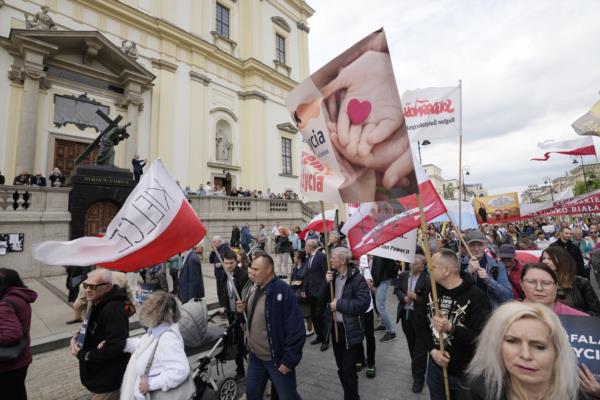
Thousands of Polish opponents of abortion gathered in Warsaw on Sunday to demonstrate against recent efforts by the new government to ease the nation's strict abortion laws. The protest comes in response to proposed changes that would allow termination of pregnancy up to the 12th week, a move that has sparked controversy in the predominantly Catholic country.
The downtown march saw participants pushing prams with children, waving national flags, and holding posters depicting fetuses in the womb. The Catholic Church in Poland declared Sunday a day of prayer in defense of conceived life and expressed support for the anti-abortion movement behind the march.
A federation of anti-abortion groups emphasized the importance of protecting human life from conception to natural death, citing concerns over the recent promotion of abortion in the country. The government, led by Prime Minister Donald Tusk, has been working to relax the stringent abortion law put in place by the previous conservative administration.









While the parliament has initiated detailed discussions on proposals to lift the near-ban on abortions, it is expected that President Andrzej Duda, a conservative, will ultimately reject the measures. Duda recently vetoed a bill that would have made the morning-after pill available over the counter to individuals aged 15 and above.
Poland, with a population of approximately 38 million, is grappling with a low birth rate, one of the lowest in the European Union at 1.2 births per woman. The aging and shrinking population has been a focal point in the debate over abortion laws, with the previous government advocating for stricter regulations to address demographic challenges.
Currently, abortions in Poland are permitted only in cases of rape, incest, or when the woman's life or health is at risk. Official data from the Health Ministry indicates that 161 abortions were conducted in Polish hospitals in 2022. However, abortion advocates estimate that around 120,000 women in Poland undergo abortions annually, often resorting to obtaining pills from overseas.
Despite the legality of self-induced abortions for women, individuals assisting in the process can face up to three years in prison. This legal framework has led to doctors refusing to perform abortions even in cases where it is allowed, fearing legal repercussions.
Proposed legislative changes include decriminalizing assistance in obtaining abortions, reintroducing the right to terminate pregnancies in cases of fetal defects, and permitting abortions up to the 12th week of gestation. The ongoing debate reflects the deep divisions within Polish society on the issue of abortion and reproductive rights.






